Surah Rahman / Surah Ar Rahman
Surah Rahman / Surah Ar Rahman, the 55th chapter of the Quran, is a unique and poetic masterpiece that serves as a divine list of Allah’s countless blessings. Famously named after one of Allah’s most beautiful attributes—The Most Merciful—its central message is a profound reminder of His mercy evident in all of creation. The Surah’s rhythm is defined by a powerful, recurring rhetorical question: “So which of the favors of your Lord will you deny?” (فَبِأَيِّ آلَاءِ رَبِّكُمَا تُكَذِّبَانِ). This verse is repeated 31 times to mankind and jinn, serving as a constant reminder to reflect on blessings from the sun and the moon to the food they eat and the creation of man. Surah Ar-Rahman details the immense favors in both this life and the Hereafter, painting a vivid picture of the rewards of Paradise and the punishments of Hell, ultimately calling on all to recognize and be grateful for the mercy of their Lord.
Surah Ar Rahman Overview
| Surah Ar Rahman Ayats | Surah Rahman Words | Surah Rehman Letter | Surah Al Rahman Ruku |
| 78 | 352 | 1641 | 3 |
Listen Surah Rahman Online
Color Coded Tajweed Rules

Read Surah Ar Rahman Online
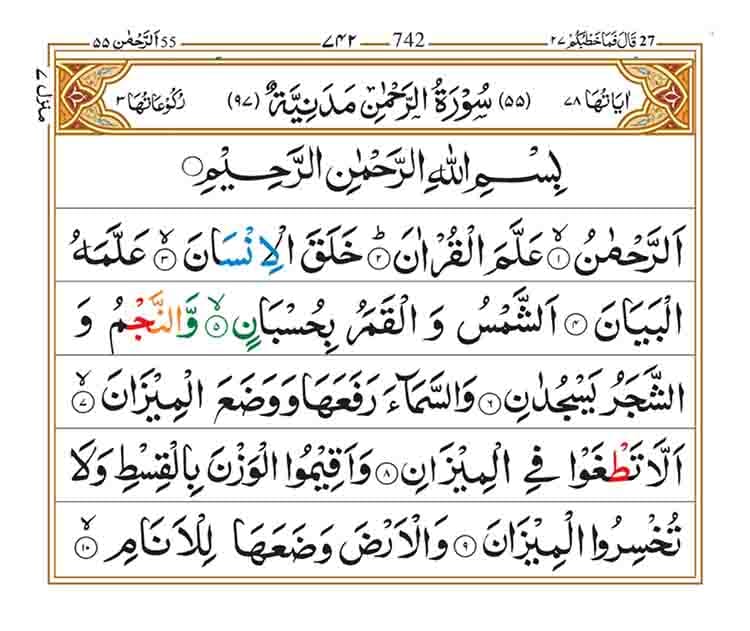
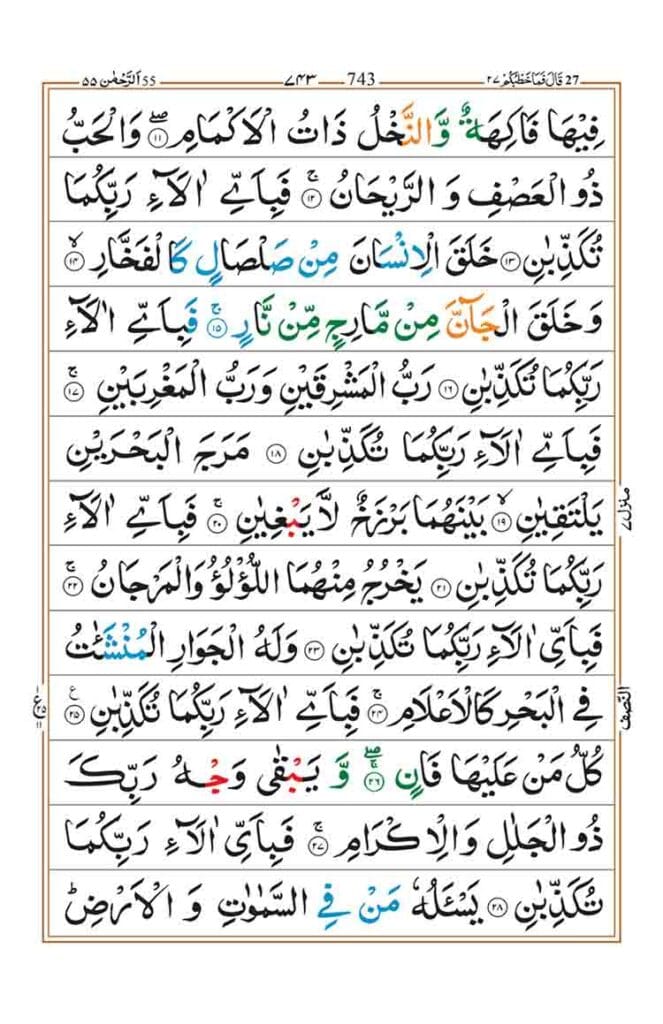
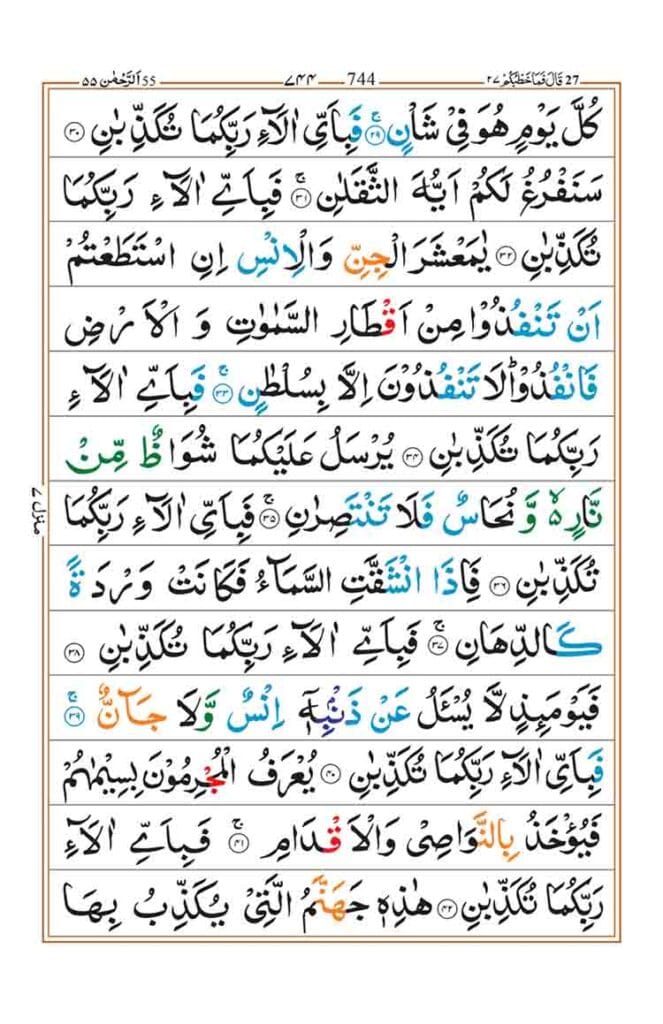
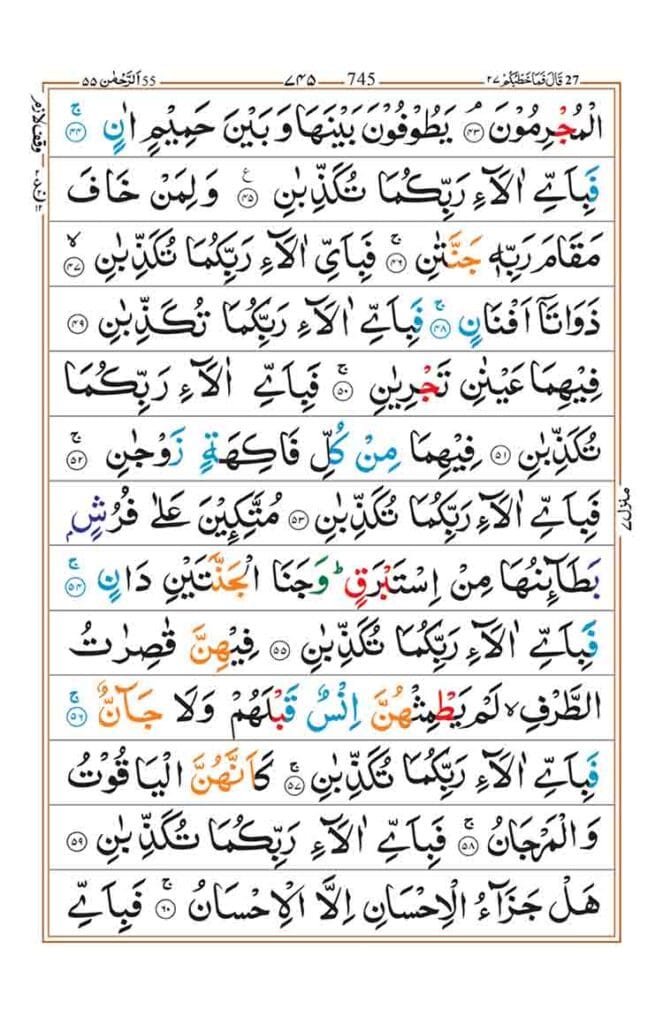
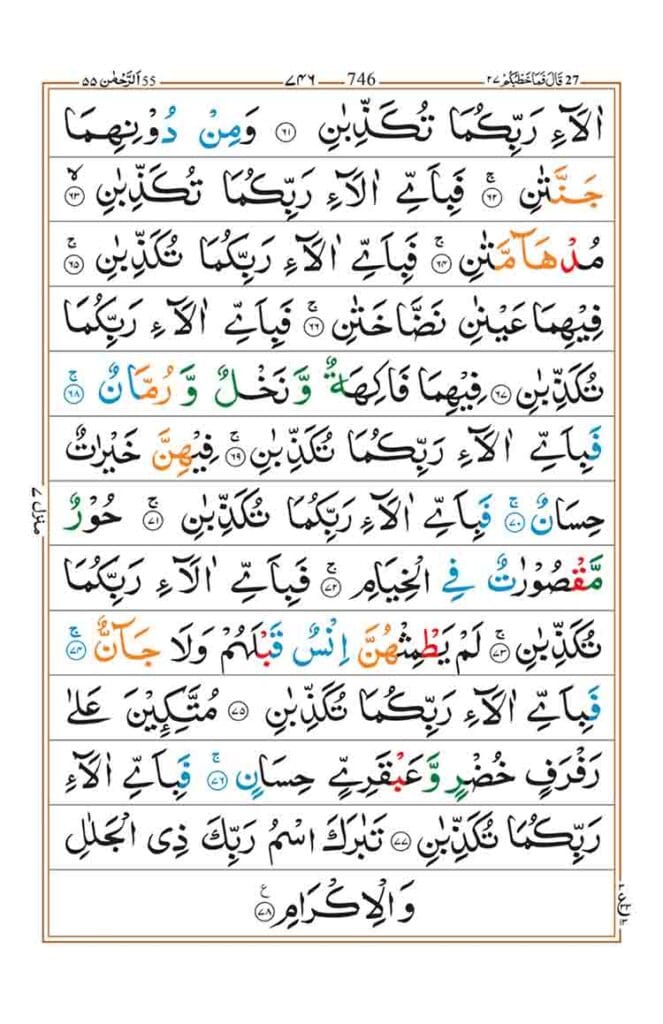
Meaning & Importance of Surah Ar Rahman
The name “Ar-Rahman” captures the essence of Allah’s boundless mercy. Surah Ar-Rahman is often referred to as the “beauty of the Quran” due to its poetic balance, repetition, and profound meanings.
Key themes in Surah Ar Rahman include:
Key themes in Surah Ar-Rahman are presented in a powerful, rhythmic sequence to captivate the listener and prompt deep reflection.
- A Celebration of Allah’s Unmatched Blessings: The Surah opens by naming Allah as the Most Merciful and then immediately begins listing His favors upon all of creation. It details everything from the most profound blessings, such as the teaching of the Quran and the creation of man, to the natural wonders like the sun, moon, stars, and the flowing seas, demonstrating that every aspect of existence is a gift.
- A Direct Call to Accountability for Mankind and Jinn: The Surah uniquely addresses both humans and jinn, who share the Earth, reminding them of their joint responsibility to their Lord. The powerful, recurring rhetorical question, “So which of the favors of your Lord will you deny?”, serves as a direct challenge to both creations, demanding a response of gratitude and submission.
- A Vivid Description of Paradise and Its Rewards: The Surah transitions from the blessings of this world to the immense, unimaginable rewards awaiting the righteous in the Hereafter. It paints a detailed picture of Paradise, describing its lush gardens with flowing springs, a variety of fruits, and beautiful companions, all designed to be the ultimate reward for piety.
- A Stark Contrast Between Two Destinies: The Surah powerfully contrasts the fate of those who are righteous with that of the rebellious. The Gardens of Bliss are set against the blazing fire of Hell, creating a compelling choice for the reader. This serves as a final, urgent warning to those who deny Allah’s favors and fail to live a life of gratitude.
- An Invitation to Reflect on the Universe and the Soul: Ultimately, the Surah’s rhythmic blessings and warnings are a constant call to reflect on Allah’s signs. It urges every individual to look at the harmony of the cosmos and the wisdom in their own creation, compelling them to turn back to their Lord in gratitude and worship.
Virtues & Benefits of Surah Ar Rahman
Known for its exceptional eloquence and beauty, Surah Ar-Rahman is often called the “bride of the Quran.” Reciting this powerful Surah brings a profound sense of peace, comfort, and deep spiritual connection, largely due to its repeated rhetorical question, “So which of the favors of your Lord will you deny?” This recurring verse serves as a constant, rhythmic reminder to practice gratitude by reflecting on the countless blessings in the natural world, the promise of the afterlife, and our daily lives. Frequent recitation is said to bring healing, mercy, and spiritual purification, which is why many scholars and imams recommend it to strengthen one’s relationship with Allah, grow in gratitude, and attain a deep inner peace.
Read More Surahs
Surah Yaseen | Surah Maryam | Surah Yusuf |
Surah Waqiah | Surah Kahf | Surah Rahman |
Surah Juma | Surah Muzammil | Surah Falaq |
